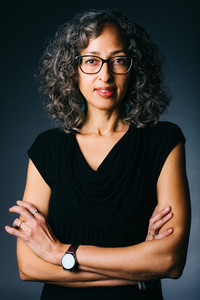GFF Conference "Speculative Fiction and Ethics"
(Sept. 23-25, 2021)
The annual conference of the Gesellschaft für Fantastikforschung e.V. (GFF) was jointly organized by a group of scholars from the University of Cologne and the University of Bamberg:
- JProf. Dr. Judith Rauscher (U of Cologne)
- Mareike Spychala (U of Bamberg)
- Sara Tewelde-Negassi (U of Cologne)
- Lorena Bickert (U of Bamberg)
You can find a PDF of the detailed conference program here.
Special Events
All three special events of the conference were open to the interested public. We thank our five speakers, the conference participants, and the nearly 80 registered guests who attended one or several of the special events.
Keynote Lecture by Prof. Dr. Ingo Cornils (U of Leeds, UK): "Dark Mirrors: German Science Fiction in the 21 Century" (Thursday, September 23, 6 p.m., Zoom)
Abstract: German SF in the 21st century tends to see the dystopian form as the ideal vehicle to explore the social and psychological consequences of scientific and technological progress. There is no point in denying that the ‘dystopian turn’ reflects the mood of our time, and that the first two decades of the new millennium have given rise to fears and misgivings about increasingly porous boundaries, conceptual paradigm shifts, and persistent global challenges that make our scientific and technological advances feel hollow. At the same time, one may wonder whether the endless depiction of depressing futures in recent SF may not in fact yield diminishing returns in terms of the intended warning function and instead convince its audiences to give up hope altogether. In my keynote lecture I will look at recent German SF novels (Thomas von Steinaecker’s Die Verteidigung des Paradieses and Sibylle Berg’s GRM: Brainfuck), to analyze how they establish their dystopian worldview. But I will also be looking at the green shoots of positive visions (Tom Hillenbrand’s Qube, Andreas Brandhorst’s Die Eskalation, Judith and Christian Vogt’s Wasteland, and Andreas Eschbach’s Eines Menschen Flügel). These give us glimpses of “concrete utopias” even as they contemplate the destructive impact of human activity on our planet. I argue that these latter works demonstrate a radical rethinking of the purpose of writing SF in the 21st century, offering a “progressive fantastic”, and a new hope.

Prof. Dr. Ingo Cornils is professor of German Literature and Culture of the 20th/21st Century at the University of Leeds (UK). In his research, he focuses on utopian thought Science Fiction, th German Student Movement ('1968'), German Romanticism, German Current Affairs, and "Zukunftsbewältigung." Prof. Cornils is a long-standing member of the Gesellschaft für Fantastikforschung (GfF) and the author of Beyond Tomorrow: German Science Fiction and Utopian Thought in the 20th and 21st Century (2020). Find more information on his work on his personal website.
Author Reading by Sofia Samatar (James Madison U, USA): "Fairy Tales for Robots" (Friday, September 24, 6 p.m., Zoom)
This event is organized with the support of Amerikahaus NRW e.V.

Sofia Samatar is the author of the novels A Stranger in Olondria and The Winged Histories, the short story collection, Tender, and Monster Portraits, a collaboration with her brother, the artist Del Samatar. Her work has won several awards, including the World Fantasy Award. She is a long-standing member of the International Association for the Fantastic in the Arts (IAFA) and she teaches African literature, Arabic literature, and speculative fiction at James Madison University. During this event, she will read from her story "Fairy Tales for Robots" and discuss questions of ethics in Fantasy and Science Fiction, focusing on the way old stories can illuminate current concerns. What do the magical beings and animated dolls of fairy tales share with robots? How might fairytale depictions of nonhumans comment on artificial intelligence? Where do the oldest stories gesture toward issues that haunt technological societies, such as racialized and gender-based violence, economic injustice, and environmental degradation? And what explains the powerful attraction in tales of the non-quite-human, both in the past and today?
Panel-Diskussion: "Queere Fantastik: Gegenwart und Zukunft" (Samstag, 25. September, 17 Uhr, Zoom)
In dieser Panel-Diskussion kamen drei zeitgenössische Autor*innen der deutschen Science Fiction und Fantasy-Literatur zur Geschichte, aktuellen Situation, und zu Entwicklungen in der queeren deutschen Science Fiction und Fantasy Literatur zu Wort. An der Diskussionsrunde nahmen teil:
-
Sameena Jehanzeb (Science Fiction und Fantasy Autorin, Illustratorin, Designerin)
-
Juri Susanne Pavlovic (Fantasy Autor*in, Textehexe*r und Lektor*in)
-
Judith C. Vogt (Science Fiction und Fantasy Autorin, Rollenspielentwicklerin, Mit-Herausgeberin von Queer*Welten)